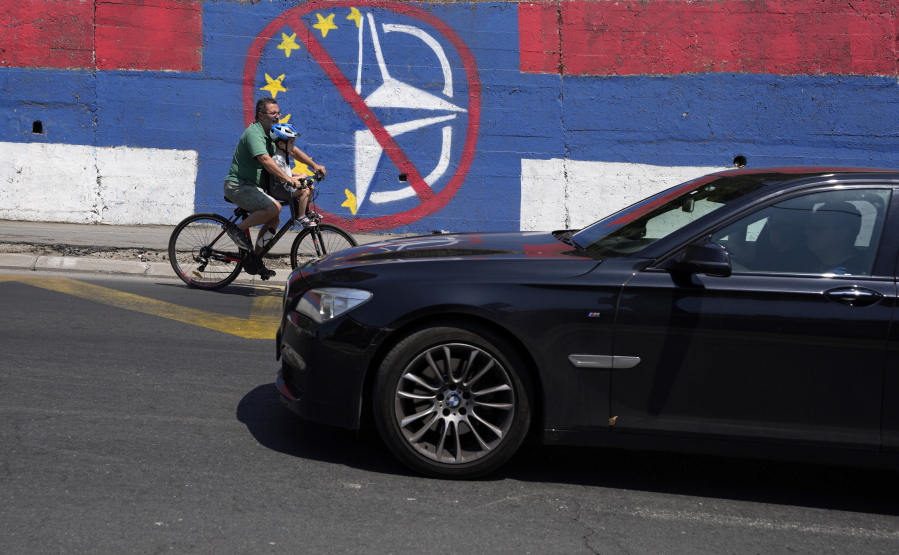BELGRADE, Serbia (AP) — European Union leaders will seek to offer support this week to six Western Balkan countries that have long been knocking at the bloc’s doors, and now see the war in Ukraine raging not far from their borders amid fears Russia could turn its sights on their region.
The two-day summit starting Thursday in Brussels is expected to approve the European Commission’s proposal to give Ukraine and Moldova candidate EU membership status, the beginning of a long process that the Western Balkan Six started years ago.
Russia’s invasion of Ukraine has increased the urgency of getting the historically volatile Western Balkans into the EU fold as some of the region’s states — chiefly Serbia — are increasingly turning toward Moscow, both politically and militarily.
The EC has repeatedly told Albania, Bosnia, Kosovo, Montenegro, North Macedonia and Serbia that their future lies within the 27-nation bloc. But progress has stalled — for all sorts of reasons. The countries are at different levels of negotiations and fulfilling numerous membership requirements, with Montenegro leading the pack and Kosovo not even starting the talks.
Clement Beaune, France’s minister for European affairs, said the war in Ukraine makes it even more essential that the six countries get a renewed perspective.
WHY ALL THE FUSS?
The Kremlin has for years been saying it considers the Balkans its zone of “strategic interest,” although the six Western Balkan states were never part of the Soviet bloc.
Russian officials say they don’t mind them joining the EU, but strongly objected when Albania, Montenegro and North Macedonia joined NATO, and when Bosnia announced plans to seek alliance membership.
Tiny Montenegro was warned that it could be targeted by Russian long-range missiles after it joined EU sanctions against Moscow over Ukraine.
WHAT’S THE ROLE OF SERBIA?
Serbia, the largest of the six countries, is pivotal in Russia’s regional influence. After a brief pro-Western government in the early 2000s — when the country launched its EU accession bid — former ultranationalists took power 10 years ago, leaning Serbia more toward traditional Slavic ally Russia, and China.
While still formally seeking EU membership, and although the EU is by far Serbia’s biggest trading partner, Belgrade refused to align its foreign policies with the bloc’s, including to impose sanctions on Moscow.
Pro-Putin propaganda in state-controlled media is so widespread that for the first time since Serbia submitted its EU bid support for joining the bloc is below 50%. Top EU officials have told Belgrade it will soon have to make up its mind whether it wants to continue on its EU path by complying with its policies and standards.
AND BOSNIA?
After the European Commission tapped Ukraine for candidate status, many asked why multi-ethnic Bosnia — which also went through a bloody war in the 1990s — doesn’t get the same status. EU member Slovenia said it will propose Bosnia’s candidacy at this week’s summit.
The move to let Ukraine leapfrog others in the long candidacy queue has reawakened fears in the Western Balkans that the region could be left behind as the EU focuses on Ukraine and its neighbor Moldova.
Bosnia has faced open threats from Russian officials for its plan to seek NATO membership and has also been destabilized by secessionist threats from Bosnian Serbs who control about half of the Balkan country.
NORTH MACEDONIA: LOUD NEIGHBORS
North Macedonia applied for EU membership in 2004, and is still waiting for the start of its accession talks after repeated obstacles placed by neighboring EU members.
First Greece required that the country then known as Macedonia should change its name, saying it implied claims on the northern Greek province of Macedonia. In 2018 the country agreed to rename itself North Macedonia, hoping that would unlock its EU bid.
But then Bulgaria vetoed membership talks, pending settlement of its own disputes with North Macedonia that include historic and cultural issues. France said it is making last-ditch efforts to overcome the problem — although it doesn’t help that Bulgaria is currently facing a new political crisis.
WHAT ABOUT MONTENEGRO?
Tiny Montenegro has fulfilled most of its EU membership obligations, but still seems far from becoming a member.
It has applied EU sanctions against Russia over Ukraine, drawing angry responses from the Kremlin. It has also managed to stave off attempts of destabilization from both Russia and neighboring Serbia after it joined NATO.
ALBANIA: COLLATERAL DAMAGE
Albania’s candidacy bid has been stalled mostly because it’s tied to North Macedonia’s, which is being blocked by Bulgaria.
Prime Minister Edi Rama said if no progress is made at the EU summit this week he will seek to decouple the two processes.
But in a recent visit to Kyiv alongside Montenegrin counterpart Dritan Abazovic, Rama said both still fully support Ukraine’s request to get EU candidate status.
“No one should speculate with the fact that because Europe has not kept its promise to us, we do not feel well now it is taking the step for Ukraine,” Rama said.
KOSOVO: AT THE BACK OF THE LINE
Kosovo, a former Serbian province that broke off following a separatist uprising and NATO bombing campaign against Serbia, declaring independence in 2008, seems to be last in line for membership talks. Five EU states don’t even recognize it as a country, and its U.N. membership has been blocked in the Security Council by Serbia’s allies Russia and China.



